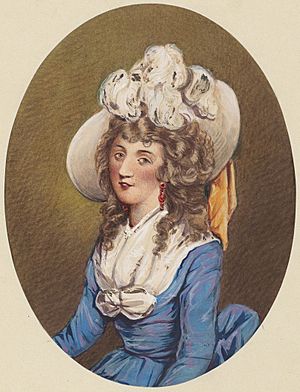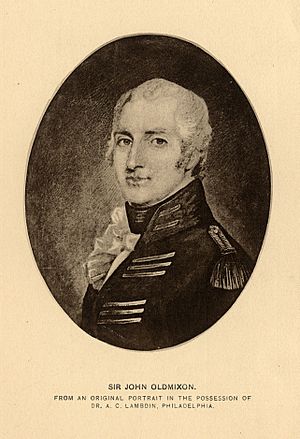Georgina George facts for kids
Quick facts for kids
Georgina George (Mrs Oldmixon)
|
|
|---|---|
 |
|
| Born | |
| Died | February 3, 1835 |
| Nationality | British |
| Other names | Lady Oldmixon |
| Occupation | Actor and singer |
| Known for | Singing |
| Spouse(s) | Sir John Oldmixon |
Georgina George was a talented English singer and actress. She performed in England before moving to the United States. There, she became known as Mrs. Oldmixon. She was also sometimes called Lady Oldmixon. She was born in Oxford, but we don't know the exact year. She passed away in Philadelphia on February 3, 1835.
Contents
Early Life and First Performances
Georgina George was born in Oxford, England. We don't know her exact birth year. She started her singing career in Oxford. Her first public performance was on February 11, 1779. This happened at the Holywell Music Room in Oxford. She sang there for four seasons. In 1780, her father had a disagreement with a cello player named G. Morello. Morello was upset because Georgina did not perform at his special show.
Moving to London's Stages
In 1783, Georgina moved to London. She quickly became a popular singer there. She performed at some of the most famous theatres. First, she sang at the Covent Garden. After that, she spent three years performing at the Drury Lane.
From Singer to Actress
Georgina didn't just sing. She also started acting in plays. She took on the role of Rosetta in a play called Love in a Village. She also performed in Comus and Artaxerxes. All these shows were written by the famous composer Thomas Arne.
Meeting Sir John Oldmixon
During the 1787–8 season, Georgina performed at the Royalty Theatre in East London. She appeared in a play called Apollo Turn'd Stroller. This play was special because it was written by Sir John Morella Oldmixon. He was a fashionable army officer. Sir John Oldmixon was once known for his perfect hair curls in Bath. By 1793, reports said that Georgina had married him. Around this time, they both needed money. Georgina then received an offer to perform in America.
Life in Philadelphia
Georgina and her husband moved to America. On May 14, 1794, she sang in a show called "Robin Hood." This performance took place at Thomas Wignell's theatre in Philadelphia. The posters for the Chestnut Street Theatre listed her as Mrs. Oldmixon.
They bought a house in Germantown, which was nearby. Her husband grew vegetables there. He would drive into the city every day to sell his produce. He also drove Georgina to her performances. Their marriage did not last. Her husband eventually moved away to live in Long Island.
Georgina George passed away in Philadelphia in 1835.
 | Jackie Robinson |
 | Jack Johnson |
 | Althea Gibson |
 | Arthur Ashe |
 | Muhammad Ali |


